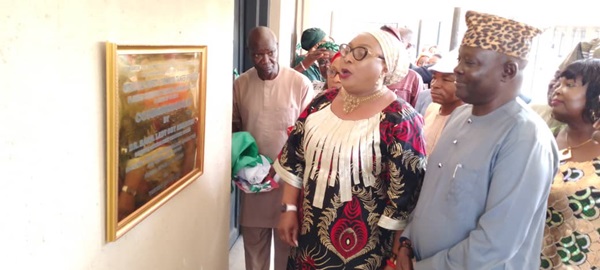
In a strategic move to strengthen intellectual property rights (IPR) awareness within Nigerian knowledge institutions, the National Office for Technology Acquisition and Promotion (NOTAP) has commissioned the 68th Intellectual Property and Technology Transfer Office (IPTTO) at Plateau State Polytechnic, Barkin Ladi, Plateau State.
During the commissioning ceremony, the director-general and CEO of NOTAP, Dr. Obiageli Amadiobi stated that the establishment of IPTTOs across Nigerian institutions aims to build a culture of intellectual property awareness and to promote innovation as a key driver of national economic sustainability.
She explained that as Nigeria’s regulatory agency for technology transfer, NOTAP identified a significant lack of intellectual property consciousness within universities and polytechnics. In response, the Office, in collaboration with the World Intellectual Property Organization (WIPO), launched the IPTTO initiative in 2006 to address the gap and stimulate meaningful research-to-market pathways.
Amadiobi emphasised that while NOTAP’s core mandate includes regulating the inflow of foreign technologies through the registration of technology transfer agreements, the agency also bears the responsibility of encouraging the development and protection of locally generated innovations.
During its regulatory operations, the agency observed that Nigeria’s knowledge institutions lacked robust intellectual property systems, a situation she described as unacceptable for a country aspiring to become a major player in the global innovation ecosystem.
She asserted that understanding the value of intellectual property is vital to the success of Nigerian universities and polytechnics, which are central to research and development efforts. Drawing comparisons with advanced countries, she noted that institutions abroad generate significant revenue from their intellectual property assets, which not only sustains them but also contributes substantially to their national GDP.
According to her, Nigerian institutions must begin to solve societal challenges by producing technically competent graduates who can transform the country’s economy through innovation and enterprise. She urged academic researchers to shift from conventional, publication-driven research to market-relevant and demand-driven investigations that could yield tangible socio-economic benefits.
Amadiobi lamented the large volume of inventions and innovations that remain unused on the shelves of Nigerian institutions due to weak commercialisation systems. She stressed that IPTTOs were specifically established to bridge this gap and help turn ideas into viable goods and services for public use.
She encouraged the Plateau State Polytechnic and the host community of Barkin Ladi to maximise the opportunities provided by the new IPTTO by submitting their research outcomes to NOTAP for patenting, free of charge. Although intellectual property may be intangible, she noted, its protection is essential to ensure inventors gain exclusive financial rights to their work.
Reaffirming NOTAP’s commitment, Amadiobi pledged continued support for promoting the spirit of innovation across Nigeria through sustained advocacy and partnerships that strengthen the national IPR framework. She disclosed that the agency has facilitated the acquisition of over 340 patent certificates for Nigerian inventors at no cost, and challenged the Polytechnic to ensure it features prominently in the next IPTTO performance ranking.
In his welcome remarks, the rector of Plateau State Polytechnic, Dr Clement Selchum described the selection of the institution for the IPTTO as a strong endorsement of his administration’s dedication to excellence and strategic leadership. He said the IPTTO would encourage collaborative research and accelerate invention and technological advancement in the school.
He described the IPTTO as a vital platform that bridges the gap between academic research and industry, adding that it would help convert intellectual ideas into practical, real-world applications. He noted that in today’s fast-evolving technological landscape, intellectual property has become the cornerstone of economic competitiveness. According to him, the polytechnic feels privileged to be chosen as a driver of such a critical national agenda.
Selchum expressed deep appreciation to NOTAP for the establishment of the IPTTO, calling it a gift to the institution and the entire community. He challenged both staff and students to justify the Centre’s presence by cultivating an environment of creativity and innovation.
In a paper titled “Intellectual Property Assets Management”, the director of technology acquisition and research coordination (TARC), Caroline Anie-Osuagwu explained that intellectual property assets include patents, trademarks, copyrighted works, industrial designs, geographical indications, and trade secrets. These, she said, are carefully selected based on their potential business value and play a critical role in wealth generation.
She emphasised that those who understand how to create and manage intellectual property assets are building global brands and earning substantial income in foreign currencies. Anie-Osuagwu urged researchers to embrace demand-driven research approaches and take proactive steps to protect their innovations, thereby positioning themselves to reap the commercial rewards of their efforts.
In a statement released by the agency’s head of public relations and protocol signed by Raymond Ogbu, Anie-Osuagwu encouraged local researchers to submit their findings for patenting and to build partnerships that would translate research into market-ready technologies.
With the commissioning of the 68th IPTTO, NOTAP continues to underscore the pivotal role of intellectual property in national development and the importance of empowering Nigerian institutions to take ownership of their innovations for long-term sustainability.


